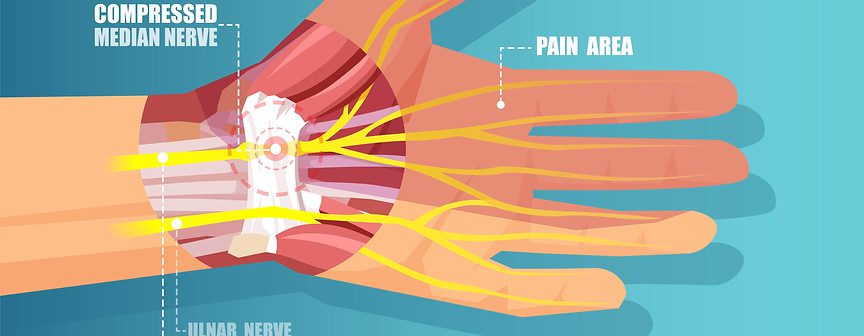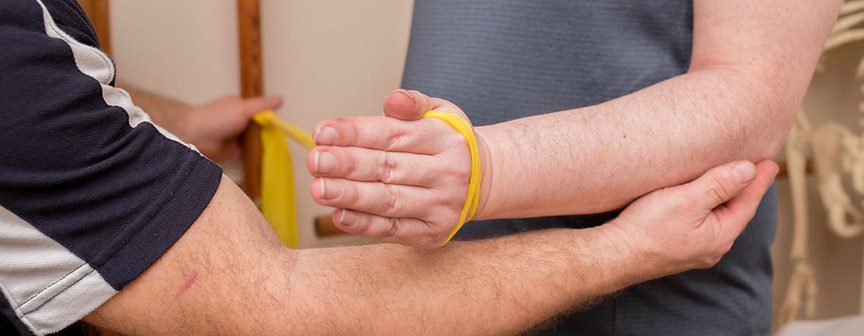Carpal Tunnel Syndrome

Carpal Tunnel Syndrome is a relatively common condition, often affecting women more than men, it affects the nerves around the wrist area.
This causes pain and numbness in the hand, often at night. Incidences of carpal tunnel are increasing due to the excessive use of phones and computers.
Professions that use their hands, such as hairdressers, massage therapists, podiatrists etc are also more likely to get this.
What Is Carpal Tunnel Syndrome?

Carpal Tunnel syndrome is named due to it’s position. The carpal bones of the wrist and the carpal ligament, form a “tunnel” through which one of the nerves of the hand run through.
Ligaments, by their nature aren’t very stretchy, and the bones of the wrist are also solid, so if this tunnel becomes smaller, through inflammation, the nerve can get irritated, creating numbness.
Carpal tunnel only affects one of the two nerves in the wrist, the median nerve, which gives a nerve supply to the thumb, first 2 fingers and half of the third finger.
So if you get a fully numb hand, that affects all the fingers, this is unlikely to be carpal tunnel syndrome and more likely to be coming from further up the nerve line. The neck is often implicated in carpal tunnel syndrome.
Diagnosing Carpal Tunnel Syndrome

Diagnosis of carpal tunnel can be done via a nerve conduction study, which checks how well the nerve is functioning.
An ultrasound scan can also look at the area and check for any signs of the nerve becoming compromised. In the clinic we can do various tests, to see whether the nerve is being caught.
We can test the nerve line and assess whether this is a local problem, just limited to the wrist, or whether the nerve issue is coming from further up the arm.
This is important, as many nerve issues in the wrist are incorrectly assumed to be carpal tunnel, when it is often an issue coming from poor posture in the neck and shoulder which can also catch the nerve and cause similar symptoms.
How do you treat carpal tunnel?

Often Carpal Tunnel affects people at night and a night splint can be used to help relieve these symptoms. The night splint gently stretches the area and stops the wrist from closing up while you are asleep. It can be very useful in the early stages of treatment.
Treatment of carpal tunnel should never just involve the wrist. When treating the wrist we also treat the whole arm, shoulder and neck. If you have a head that is sitting in a forward position and have rounded shoulders, the first place to start is to release and restrengthen these elements and bring the posture back to more normal positions. This is often enough to remove the symptoms the client is feeling in the wrist, as it addresses the whole nerve line.
To help the nerve become less angry, we can mobilise and treat the nerve line from the neck all the way down to the fingers. Muscles within the neck can compromise the nerve line that runs to the wrist, so we loosen the neck muscles and strengthen the stabilisers of the neck, to open up the vertebra and ensure the nerve isn’t being compromised as it exits the neck.
Next we loosen the chest muscles, as the nerve will often get caught as it passes under the clavicle of the shoulder. This also allows for the shoulders to “drop back” into a more normal position generally.
Finally, we loosen and strengthen the whole hand and wrist to stop the pain reoccurring. Occasionally the carpal tunnel is so severe it needs an operation to “release” the nerve. These operations can be limited in their outcomes , and often because the other potential causes further up the arm, haven’t been fully checked, before resorting to surgery. If rehabilitating the neck and arm don’t solve the problem, surgery is a good solution.
Frequently Asked Questions about Carpal Tunnel
No, Surgery is rarely needed and is usually used as a last resort. Surgery isn’t always successful and requires a period of recovery which can affect your daily activities and work, so it is important to rule out all options before opting for surgery.
The NHS website has some great information on Carpal Tunnel, see this link for more information.
To diagnose Carpal Tunnel nerve conduction tests are used, though these aren’t always reliable, so MRI and Ultrasound scans are also needed.
Many conditions of the wrist can mimic Carpal Tunnel and nerve issues can often originate in the neck or shoulder, so it is important to have a thorough assessment before a diagnosis is made.
Absolutely. Most symptoms can be resolved with targeted Strength and Soft Tissue work. This may include nerve mobilisations and working on the posture of the whole upper body to fully resolve the issue for the long term.
Many clients find that a night resting splint can help to ensure a full night’s sleep without a numb hand waking them. They are easy and cheap to purchase online and are very useful in the early days of managing the condition.
Sometimes the use of an overly high or low pillow can exacerbate the nerve symptoms, ensuring your neck is straight when you sleep can certainly help.
Any condition that affects the nerves, as Carpal Tunnel does, can take time to resolve. Nerves are slow to calm down and very easy to irritate.
We would usually expect to see some improvement after around 3 sessions, however, a full and permanent resolution can take longer.
The more focussed you are on the exercises and advice given, the faster the resolution will be.
What Our Clients Say About Us?
Francis Butt
September 20, 2022
As always, brilliant evaluation, treatment and strategy. Thanks Ian!
Claire Kelley
October 10, 2022
Ian is brilliant at really working to solve the problem. He doesn't rush to get you back but gives you time for set exercises to work and then reassess. Would definitely recommend
Helen Littlewood
October 19, 2022
Totally looked after by Ian - really reassured that he can help and support me in my goals Thank you
Zoe Statters
October 20, 2022
Always upbeat, friendly, offers useful advice & service is always top notch, suggestions and treatments that actually work!
Matt Morrisey
December 8, 2022
EXCELLENT , HELPED ME UNDERSTAND ALL MY ISSUES AND HOW TO START TO RE AJUST
Sonia Chamberlain
September 5, 2023
Gina is a brilliant therapist! Very friendly, supportive and provides a holistic approach to MSK problems.
Megan Thomas
September 5, 2023
Very professional assessment and recommended remedial action that generated far better results than expected. I am as good as new, great work Gina!
Katie Silverthorne
September 5, 2023
Gina is an absolutely marvel! I had incredibly painful and chronic shoulder pain that had been causing serious issue for over 2 years. I had been to lots of different practitioners - with no luck. Happily Gina set me right! I couldn’t be happier. ????
Wynford Dore
September 5, 2023
I needed the pain to go away....yet had discovered in recent years that not all physios are equal! So I put more effort into finding one that was good - and subsequently went to Gina at The Reinge Clinic. Bottom line .... the pain has completely gone - she seemed to know quickly where the root cause of the problem was hiding, and addressed it. Only took 3 sessions - I had expected it to take far longer. Huge thanks.
Sarita Bhardwaj
September 5, 2023
Gina was very informative, patient and she successful in completely eliminating my shoulder and arm problems - Thank you so much!